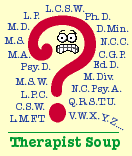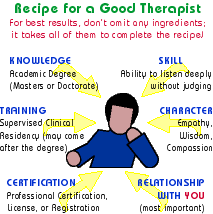| < BACK CONTENTS NEXT > |
11 - Therapist credentials: the truth revealed
A lot of bandwidth has been spent attempting to compare, defend, or even just explain the professional credentials of psychotherapists. It is  incredibly confusing. There are literally hundreds of designations, and you can quickly drown in a sea of letters: Ph.D., M.D., L.P.C., Psy.D., M.F.C.C., L.C.S.W., etc. Some are licensed, some are certified, others are registered. They may have a particular orientation like psychoanalytic, psychodynamic, cognitive/behavioral, gestalt, solution-focused, etc. It can be traumatic just trying to understand it all, let alone decide what kind of therapist to see.
incredibly confusing. There are literally hundreds of designations, and you can quickly drown in a sea of letters: Ph.D., M.D., L.P.C., Psy.D., M.F.C.C., L.C.S.W., etc. Some are licensed, some are certified, others are registered. They may have a particular orientation like psychoanalytic, psychodynamic, cognitive/behavioral, gestalt, solution-focused, etc. It can be traumatic just trying to understand it all, let alone decide what kind of therapist to see.
Of course people worry about making a wrong choice. When youre in emotional pain, you want help and you want it now. Just as you dont want an incompetent doctor, no one wants to waste their money on an incompetent therapist. Surely, somewhere in that alphabet soup is the key to good therapy... right?
 |
Well, no. After 20 years as a mental health consumer advocate, I can tell you that the energy that goes into these explanations will not necessarily help you find a good therapist. Some of that information is important. But the letters after a therapists name cannot reliably be used as a rating system to distinguish between good therapists and incompetent ones.
Unfortunately, the professions themselves dont help you figure it out. Naturally, each psychotherapist believes that his/her credentials (whatever they are) are the best, and maybe even the only valid psychotherapy credentials. If a therapist is licensed by the government, he/she will probably tell you that licensing is crucial, and may even imply that anyone without a government license is shockingly incompetent. (It isnt so!) If you ask a professional association, of course they will lead you to believe that their members are the most worthy therapists. Anyone who had to spend six years in graduate school will tell you that all counselors should have spent six years in graduate school. No matter which profession you ask, they want you to believe they are the best.
But an academic degree, and even a government license, are not infallible guarantees that a particular therapist will be successful helping you. Since therapy is as much an art as a science, there is a degree of plain old talent required, which is difficult to define with credentials; not to mention human qualities of compassion, empathy and character. Some very talented counselors have no official credentials at all.
After many years of experience as a mental health consumer advocate,
I can tell you three things with certainty:
intensive academic study in a mental health field
supervised clinical experience
certification or registration or licensure.
It is important that your therapist have some kind of professional credentials. To be a competent psychotherapist, one needs ALL THREE of the following:
|
|
A good therapist starts with a masters or a doctorate in a mental health field (MA, MS, MDiv, MSW, PhD, PsyD, EdD, DMin, MD). Wisdom, compassion and character are necessary, but they arent enough; knowledge is essential.
|
|
A good therapist has completed an extensive psychotherapy training program (clinical residency). It may have been part of his/her academic degree, or it may have been a separate postgraduate program. This is important to know about, because some PhDs and MDs have academic knowledge about psychological research or medication, but have never had actual training or practice in psychotherapy. You cant simply learn psychotherapy out of a book or in a classroom. You need the books and the classrooms, but they arent enough. A supervised residency is where they learn their trade.
|
|
After residency, and supervised experience, the therapist has been pronounced worthy by an authority to which they will be accountable. It could be a government licensing board, or some other credentialing organization. Some of the more common designations you might see include: LCSW, CSW, MFT, LMFT, MFCC, AAPC, LPC, NCC, NCPsyA.
If the therapist doesnt have all three, find someone who does.
The type of credential is not as important as therapists want you to believe. I speak from experience. A licensed psychologist is not necessarily a better therapist than a certified pastoral psychotherapist. An M.D. psychiatrist is not necessarily a better psychotherapist than a licensed professional counselor, etc.
Likewise, research has shown that the orientation of the therapist, and the technique that he/she uses, is not the biggest factor in the success of your therapy. As with credentials, therapists like to say that their techniques are the best. But research suggests that it has much more to do with their relationship with youwhich is why what Im telling you in this article is so important.
Even if theyve run the gauntlet and managed to get the professional credentials, all therapists are not equally good, and just any therapist might not be right for you personally. The very best way to evaluate a therapist is within you. If you follow the advice in this article learn just a little about the process of therapy, know what you should be able to expect, and how to listen to your own unconscious you will be able to tell if a psychotherapist is any good, or not.
![]()
If all meets with your approval so far, you're ready for the first phone call.
Next: First contact. Watch out for these red flags! >>
![]()
Home 1 2 3 4 5 6 7 8 9 10 11 12 13 14 15
![]()
- Why I wrote this article
- How to tell if a therapist is competent, or not
- What psychotherapy isand why you need to know
- The secret that you already know
- How a good therapist makes you feel safe
- The perfect therapist
- Privacy: the essential ingredient
- Non-judgmental acceptance: you deserve it
- How to choose a therapist to call
- How you find out about the therapist
- Therapist credentials: the truth revealed
- First contact. Watch out for these red flags!
- Your first session: what should happen
- Safety is in the details
- Now what?
Copyright 1991,1996, 1999 Martha Ainsworth. All rights reserved. Please refer to reprint information before reprinting or distributing all or any part of this text.

